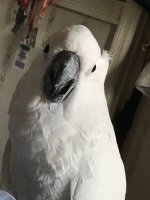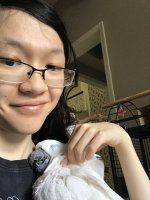gummyfoxes
Moving in
- Joined
- 2/24/17
- Messages
- 10
(no pics/vids yet unfortunately as I am on a work computer)
I recently adopted a 'too off craigslist. I was initially reluctant because I also have a baby african grey coming in later in march, but the family was really desperate for an experienced owner and a good home for their bird due to unfortunate circumstances. I decided to at least meet the bird. She is an umbrella cockatoo, super beautiful and friendly. She hopped right into my arms when I first visited her and as there were no other candidates the family felt safe with, I caved and took her in. I couldn't bear to see such a sweetie go into a bad home and be traumatized.
For more context, I have fostered another cockatoo for 8+ months, a sulfur-crested 'too who was a little devil with his own neurotic habits but I adored him nonetheless and he was the reason why I completely changed my mind about big birds (I used to be so scared of them! but now I've reached the level of calm respect with those mighty beaks). I have also fostered/owned many smaller birds and consider myself fairly experienced for my age (which, unfortunately, is still young. I can't wait to retire and be an old bird lady with a giant flock of my own). While I have warned the family I adopted from that I may need to re-home her if i get totally demolished by medical school sometime in the future (i have a lot of contingency plans against this including the support of my family and a friend who is the godmother to my birds, but who knows?), I was pretty sure I could be a good steady home for her for the next year at the very least.
So back to my concerns. This little bundle of joy came to my home recently. Her cage is still a little undersized, but I plan on correcting that as soon as my next paycheck comes in. She has settled really well, but I am concerned regarding some of her medical issues. She has a crooked beak which the previous owners have already informed me about and she gets a good trim every few months at a very good avian vet I also visit. But she also always seems to have her mouth open? It's very odd and none of my previous parrots have ever done that before.
She also has some missing toes. Sometimes it seems like she has difficulty grasping things with her feet. She prefers not to. But she does still have a fairly strong grip when she perches on my arm. The previous owners are unaware of how her toes were injured. She has apparently gone through several owners. The previous owners got her from a breeder who was trying to mate her, but she was having none of it. Before that, I'm not sure.
I just had them transfer the vet records. I was really going to prefer checking the vet records before I adopted, but admittedly things were a little rushed because the family seemed very sincere and I took their word that she was healthy if not with her little flaws. Supposedly the beak thing was from chewing her cage? As my previous foster cockatoo had a half missing beak and two missing toes, I honestly don't mind small beak or toe deformities.
I'm just wondering how I should approach the vet about this. As I currently work in the medical field, I know the standard is that information can't be transferred on the phone. I'm guessing I should go in person? I unfortunately also can't go for another 2 days due to the practice being closed on sundays and my work schedule. How worried should I be about her symptoms? I know since she's gotten along fine for 6 years already she isn't about to keel over and die, but I have recently grown super paranoid after researching a lot of avian diseases.
Side Note: She's so sweet and gentle and like the polar opposite of my old foster 'too that I'm kinda baffled at her existence LOL
I recently adopted a 'too off craigslist. I was initially reluctant because I also have a baby african grey coming in later in march, but the family was really desperate for an experienced owner and a good home for their bird due to unfortunate circumstances. I decided to at least meet the bird. She is an umbrella cockatoo, super beautiful and friendly. She hopped right into my arms when I first visited her and as there were no other candidates the family felt safe with, I caved and took her in. I couldn't bear to see such a sweetie go into a bad home and be traumatized.
For more context, I have fostered another cockatoo for 8+ months, a sulfur-crested 'too who was a little devil with his own neurotic habits but I adored him nonetheless and he was the reason why I completely changed my mind about big birds (I used to be so scared of them! but now I've reached the level of calm respect with those mighty beaks). I have also fostered/owned many smaller birds and consider myself fairly experienced for my age (which, unfortunately, is still young. I can't wait to retire and be an old bird lady with a giant flock of my own). While I have warned the family I adopted from that I may need to re-home her if i get totally demolished by medical school sometime in the future (i have a lot of contingency plans against this including the support of my family and a friend who is the godmother to my birds, but who knows?), I was pretty sure I could be a good steady home for her for the next year at the very least.
So back to my concerns. This little bundle of joy came to my home recently. Her cage is still a little undersized, but I plan on correcting that as soon as my next paycheck comes in. She has settled really well, but I am concerned regarding some of her medical issues. She has a crooked beak which the previous owners have already informed me about and she gets a good trim every few months at a very good avian vet I also visit. But she also always seems to have her mouth open? It's very odd and none of my previous parrots have ever done that before.
She also has some missing toes. Sometimes it seems like she has difficulty grasping things with her feet. She prefers not to. But she does still have a fairly strong grip when she perches on my arm. The previous owners are unaware of how her toes were injured. She has apparently gone through several owners. The previous owners got her from a breeder who was trying to mate her, but she was having none of it. Before that, I'm not sure.
I just had them transfer the vet records. I was really going to prefer checking the vet records before I adopted, but admittedly things were a little rushed because the family seemed very sincere and I took their word that she was healthy if not with her little flaws. Supposedly the beak thing was from chewing her cage? As my previous foster cockatoo had a half missing beak and two missing toes, I honestly don't mind small beak or toe deformities.
I'm just wondering how I should approach the vet about this. As I currently work in the medical field, I know the standard is that information can't be transferred on the phone. I'm guessing I should go in person? I unfortunately also can't go for another 2 days due to the practice being closed on sundays and my work schedule. How worried should I be about her symptoms? I know since she's gotten along fine for 6 years already she isn't about to keel over and die, but I have recently grown super paranoid after researching a lot of avian diseases.
Side Note: She's so sweet and gentle and like the polar opposite of my old foster 'too that I'm kinda baffled at her existence LOL



